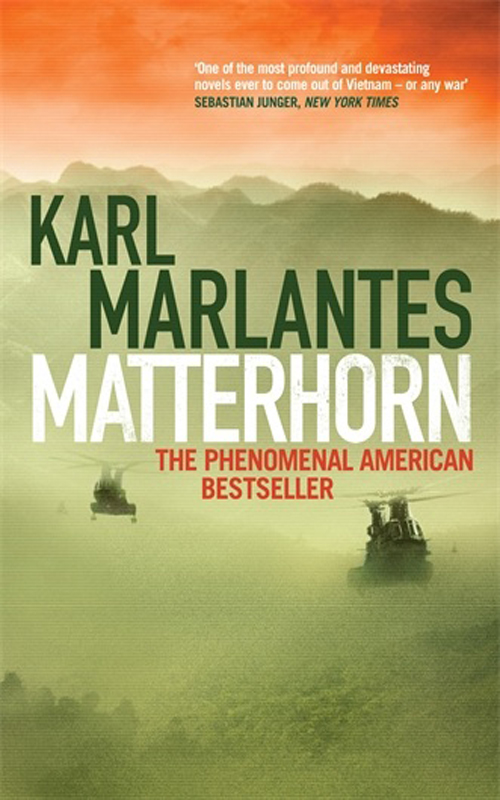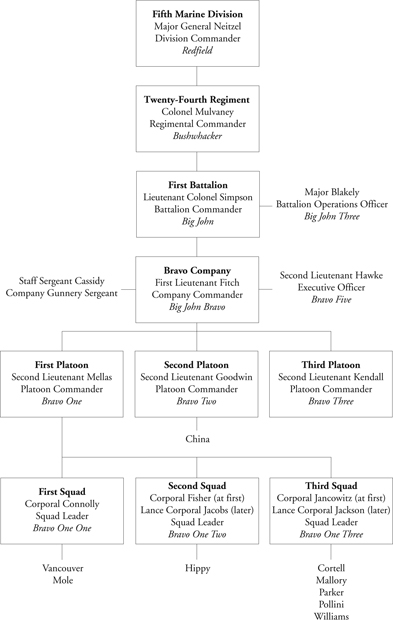Matterhorn


A graduate of Yale University and a
Rhodes Scholar at Oxford, Karl Marlantes
served as a marine in Vietnam,
where he was
awarded the Navy Cross, the Bronze Star, two
Navy Commendation Medals for Valor, two
Purple Hearts, and ten Air
Medals. He and his
wife Anne live on a small lake in western
Washington State.
Matterhorn
is his first novel.
First published in the United States of America in 2010 by Atlantic Monthly Press in
association with El León Literary Arts.
First published in hardback and trade paperback in Great Britain in 2010 by
Corvus, an imprint of Grove Atlantic Ltd.
Copyright © Karl Marlantes 2010.
The moral right of Karl Marlantes to be identified as the author
of this work has been asserted in accordance with the
Copyright,
Designs and Patents act of 1988.
All rights reserved. No part of this publication may be
reproduced, stored in a retrieval system, or transmitted in any form
or by any means, electronic, mechanical, photocopying, recording,
or otherwise, without the prior permission of both the copyright
owner and the above publisher of this book.
El León Literary Arts is a private foundation established to extend
the array of voices essential to a democracy’s arts and
education.
Excerpt from Ian Tyson’s ‘Four Rode By’ used by permission of the artist.
The characters, units, and events in this novel are fictional. The Twenty-fourth
Marines is a reserve regiment that did not
serve in Vietnam. Matterhorn,
Helicopter Hill, Sky Cap, and Eiger are fictional places and Mutter’s ridge doesn’t
extend as
far west. The novel, however, is set in Quang Tri province, Vietnam,
among other actual places. Novels need villains and heroes,
and the ones in this novel
are invented. I served under two fine battalion commanders, one of whom was
killed in action, and
their S-3 was a crackerjack infantry staff officer.
I am proud to have served with officers and enlisted men who exemplified all
the character, skill, and bravery that make one
proud to be a Marine. These
Marines fought fatigue and the failures of courage, judgment, and will that
make me proud to be
human.
First eBook Edition: January 2010
ISBN: 978-0-857-89055-9
Corvus
An imprint of Grove Atlantic Ltd
Ormond House
26-27 Boswell Street
London WC1N 3JZ
Contents
Chain of Command and Principal Characters
Glossary of Weapons, Technical Terms, Slang, and Jargon
This novel is dedicated to my children,
who grew up with the good and
bad of having a Marine combat
veteran as a father.
Shame and honor clash where the courage of a steadfast man is motley like the magpie. But such a man may yet make merry, for
Heaven and Hell have equal part in him.
Wolfram von Eschenbach
“Parzival”
A glossary explaining slang, military jargon, and technical terms has been provided at the back of the book.
(Radio call signs in italics)



ONE
M
ellas stood beneath the gray monsoon clouds on the narrow strip of cleared ground between the edge of the jungle and the relative
safety of the perimeter wire. He tried to focus on counting the other thirteen Marines of the patrol as they emerged single
file from the jungle, but exhaustion made focusing difficult. He also tried, unsuccessfully, to shut out the smell of the
shit, which sloshed in the water that half-filled the open latrine pits above him on the other side of the wire. Rain dropped
from the lip of his helmet, fell past his eyes, and spattered onto the satiny olive cloth that held the armor plating of his
cumbersome new flak jacket. The dark green T-shirt and boxer shorts that his mother had dyed for him just three weeks ago
clung to his skin, heavy and clammy beneath his camouflage utility jacket and trousers. He knew there would be leeches clinging
to his legs, arms, back, and chest beneath his wet clothes, even though he couldn’t feel them now. It was the way with leeches,
he mused. They were so small and thin before they started sucking your blood that you rarely felt them unless they fell on
you from a tree, and you never felt them piercing your skin. There was some sort of natural anesthetic in their saliva. You
would discover them later, swollen with blood, sticking out from your skin like little pregnant bellies.
When the last Marine entered the maze of switchbacks and crude gates in the barbed wire, Mellas nodded to Fisher, the squad
leader, one of three who reported to him. “Eleven plus us three,” he said. Fisher nodded back, put his thumb up in agreement,
and entered the wire. Mellas followed him, trailed by his radio operator, Hamilton.
The patrol emerged from the wire, and the young Marines climbed slowly up the slope of the new fire support base, FSB Matterhorn,
bent over with fatigue, picking their way around shattered stumps and dead trees that gave no shelter. The verdant underbrush
had been hacked down with K-bar knives to clear fields of fire for the defensive lines, and the jungle floor, once veined
with rivulets of water, was now only sucking clay.
The thin, wet straps of Mellas’s two cotton ammunition bandoleers dug into the back of his neck, each with the weight of twenty
fully loaded M-16 magazines. These straps had rubbed him raw. All he wanted to do now was get back to his hooch and take them
off, along with his soaking boots and socks. He also wanted to go unconscious. That, however, wasn’t possible. He knew he
would finally have to deal with the nagging problem that Bass, his platoon sergeant, had laid on him that morning and that
he had avoided by using the excuse of leaving on patrol. A black kid—he couldn’t remember the name; a machine gunner in Third
Squad—was upset with the company gunnery sergeant, whose name he couldn’t remember either. There were forty new names and
faces in Mellas’s platoon alone, and almost 200 in the company, and black or white they all looked the same. It overwhelmed
him. From the skipper right on down, they all wore the same filthy tattered camouflage, with no rank insignia, no way of distinguishing
them. All of them were too thin, too young, and too exhausted. They all talked the same, too, saying fuck, or some adjective,
noun, or adverb with fuck in it, every four words. Most of the intervening three words of their conversations dealt with unhappiness
about food, mail, time in the bush, and girls they had left behind in high school. Mellas swore he’d succumb to none of it.
This black kid wanted out of the bush to have his recurrent headaches examined, and some of the brothers were stirring things
up in support. The gunnery sergeant thought the kid was malingering and should have his butt kicked. Then another black kid
refused to have his hair cut and people were up in arms about
that
. Mellas was supposed to be fighting a war. No one at the Basic School had said he’d be dealing with junior Malcolm X’s and
redneck Georgia crackers. Why couldn’t
the Navy corpsmen just decide shit like whether headaches were real or not? They were supposed to be the medical experts.
Did the platoon commanders on Iwo Jima have to deal with crap like this?
As Mellas plodded slowly up the hill, with Fisher next to him and Hamilton automatically following with the radio, he became
embarrassed by the sound his boots made as they pulled free of the mud, fearing that it would draw attention to the fact that
they were still shiny and black. He quickly covered for this by complaining to Fisher about the squad’s machine gunner, Hippy,
making too much noise when Fisher had asked for the machine gun to come to the head of the small column because the point
man thought he’d heard movement. Just speaking about the recent near-encounter with an enemy Mellas had not yet seen started
his insides humming again, the vibration of fear that was like a strong electric potential with no place to discharge. Part
of him was relieved that it had been a near miss but another part acted peeved that the noise might have cost them an opportunity
for action, and this peevishness in turn irked Fisher.
When they reached the squad’s usual position in the company lines, Mellas could see that Fisher could barely contain his own
annoyance by the way he nearly threw to the ground the three staves he’d cut for himself and a couple of friends while out
on the patrol. These staves were raw material for short-timer’s sticks, elaborately carved walking sticks, roughly an inch
and a half in diameter and three to five feet long. Some were simple calendars, others works of folk art. Each stick was marked
in a way that showed how many days its owner had survived on his thirteen-month tour of duty and how many days were left to
go. Mellas had also been anxious about the sound Fisher had made cutting the three staves with a machete, but he had said
nothing. He was still in a delicate position: nominally in charge of the patrol, because he was the platoon commander, but
until he was successfully broken in he was also under the orders of Lieutenant Fitch, the company commander, to do everything
Fisher said. Mellas had accepted the noise for two reasons, both political. Fitch had basically said Fisher was in charge,
so why buck Fitch? Fitch was the guy who could promote Mellas to executive officer, second in command, when Second Lieutenant
Hawke rotated out of the bush. That
would put him in line for company commander—unless Hawke wanted it. A second reason was that Mellas hadn’t been sure if the
noise was dangerous, and he was far more worried about asking stupid questions than finding out. Too many stupid comments
and dumb questions at this stage could make it more difficult to gain the respect of the platoon, and it was a lot harder
to get ahead if the snuffs didn’t like you or thought you were incompetent. The fact that Hawke, his predecessor, had been
nearly worshipped by the platoon did not help matters.
